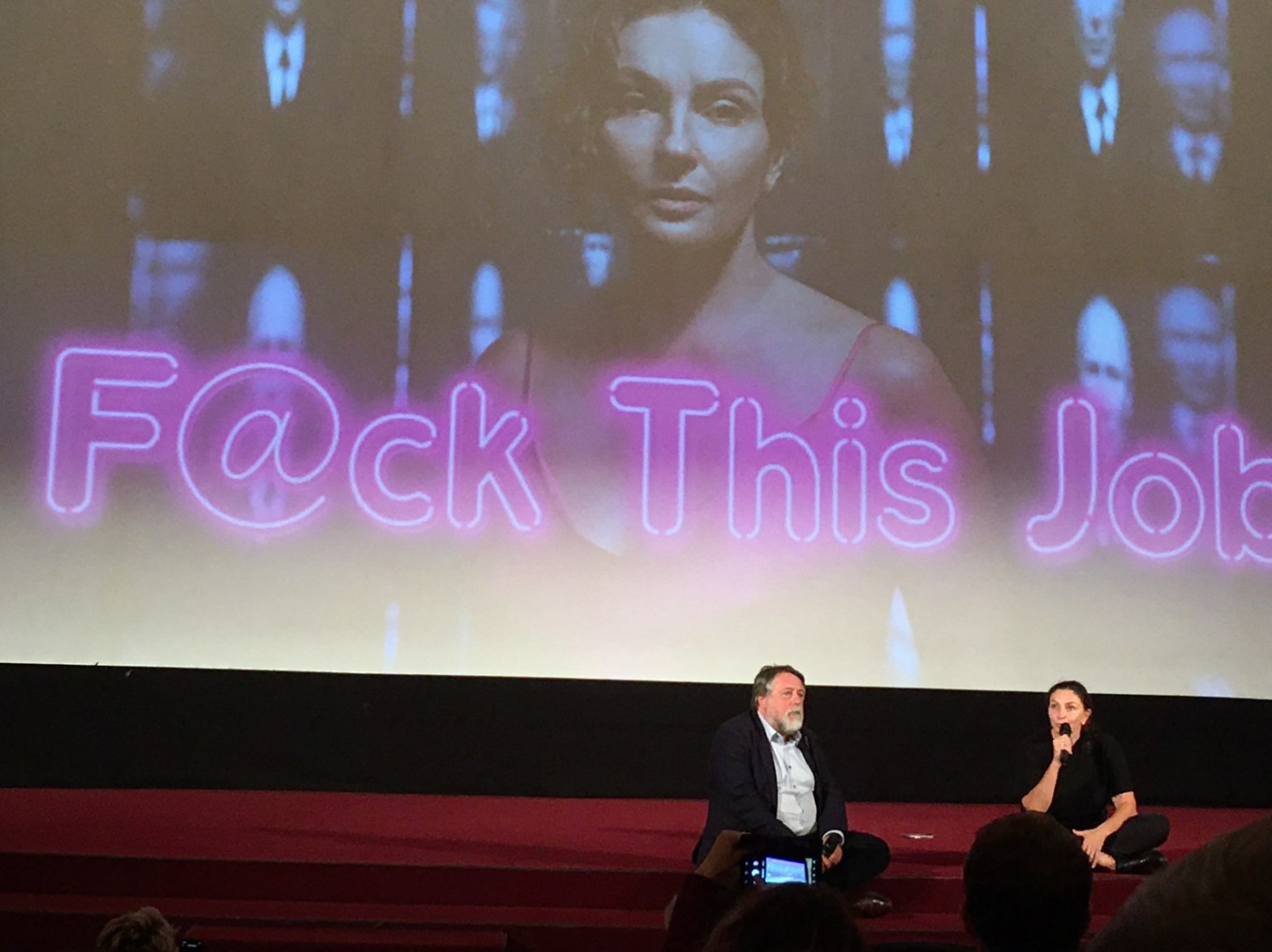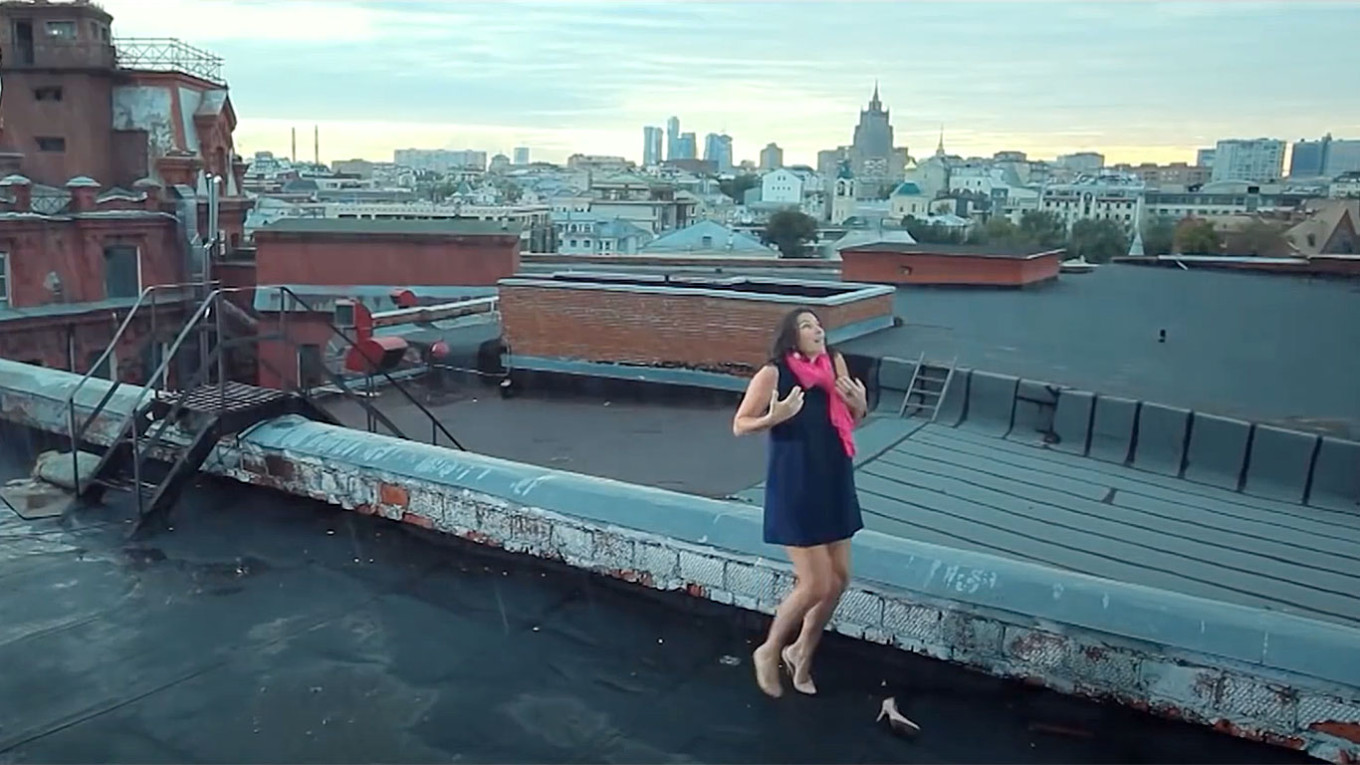Viewers in Latvia’s capital of Riga came out last week to see a screening of "F@ck This Job," a documentary about independent Russian broadcaster TV Rain (Dozhd) and its struggle to survive Vladimir Putin's war on the independent media.
It was directed and narrated by Vera Krichevskaya, a co-founder of TV Rain with Sindeeva, who arrived in Riga just after a tour of U.S. universities. TV Rain now has a broadcast license in Latvia and has moved some of its staff to an office in Riga.
The screening in Riga raised some uncomfortable questions about the role of a Russian media company in an EU and NATO country with a large Russian population.
The film itself thoroughly engaged the audience. “F@ck This Job” tells the story of a smart, lively, privileged woman who is married to a wealthy prince (a banker) and decides to start a TV channel. The year is 2010. Dmitry Medvedev is president, sharing burgers with Barack Obama and promising change; money is flowing; Moscow is getting cool and anything is possible. Sindeeva drives her bright pink car into Moscow from her suburban mansion to renovate studio space in a former candy factory, hire talented young hipsters and put her bright pink “optimistic channel” on air.
Even for someone who lived through the entire period in Moscow, it was a bit of a shock to see Moscow in those years, when refrigerators were full of good champagne, everyone looked like they just walked off a fashion show runway, gay people were on air, and the Russian president stopped in to say hello and have tea with an ebullient Sindeeva, who dressed for the occasion in a baggy shirt and artfully ripped jeans.
Slowly the on-air talent gets the hang of reading teleprompters and ad-libbing, and what first seems like college amateur hour turns into stylish, smart television. As political life starts to break bad — Medvedev hands the presidency back to Putin, protest after protest is held in Moscow over falsified elections and breaches of the constitutional right to assembly, Russia annexes Crimea and starts a proxy war in Donbas — the TV Rain team turns out to be filled with brave, tough journalists reporting live from all over, including paddy wagons on the way to another detention.
TV Rain begins to have an impact. It becomes the place where you can see real news and hear real opinions. Krichevskaya makes this point by dividing the screen into four quadrants: in one, TV Rain is covering protests or the downing of MH17 while in the other three squares the state channels are airing soap operas and made-for-tv movies.
This, we know, doesn’t end well. The better their news coverage, the more economic and political pressure is used against Sindeeva and the company. Russian authorities remove it from cable television networks, advertising revenues disappear, and the white mansion outside Moscow is sold. But somehow the show goes on until Feb. 24. A few days later the TV Rain team turns out the lights and shuts the door as ballerinas dance across the screen to “Swan Lake” — a refrain of what was broadcast during the Moscow coup attempt of 1991. Most of the journalists soon left the country.

The end credits were filled with applause from the audience. But during the post-screening question and answer session, compliments were mixed with concern. Was the TV Rain audience in Russia or was it aimed at Latvian Russian speakers, too? Were they planning to cover events and politics in Latvia? Would there be topics of particular interest to Russian speakers in the Baltic states?
The elephant in the hall was an interview that TV Rain journalist Katya Kotrikadze did with Riga Mayor Martins Stakis, which had been a hot topic in the Russian community.
Most of the interview concerned the demolition of a Soviet-era monument to “the liberators of Latvia” — that is, the Soviet army and country that occupied Latvia until 1991 — and various sources of conflict between the Latvian and Russian populations in the country.
Several audience members noted — very politely — a tinge of imperialist mindset in the interview with the mayor. Sindeeva, equally polite, replied that she thought Kotrikadze had just been doing her job as a journalist and suggested that perhaps the question of imperialist mindset was more an issue for the questioner than for Kotrikadze.
Everyone continued to smile and nod, and after a few more questions and compliments, the evening ended on a warm note. But it was clear that being a media company in a foreign country will have a new set of challenges.
'F@ck This Job' — also shown under the title "Tango With Putin" — is available online in some countries. See the site for information about broadcasts and theatrical releases.
A Message from The Moscow Times:
Dear readers,
We are facing unprecedented challenges. Russia's Prosecutor General's Office has designated The Moscow Times as an "undesirable" organization, criminalizing our work and putting our staff at risk of prosecution. This follows our earlier unjust labeling as a "foreign agent."
These actions are direct attempts to silence independent journalism in Russia. The authorities claim our work "discredits the decisions of the Russian leadership." We see things differently: we strive to provide accurate, unbiased reporting on Russia.
We, the journalists of The Moscow Times, refuse to be silenced. But to continue our work, we need your help.
Your support, no matter how small, makes a world of difference. If you can, please support us monthly starting from just $2. It's quick to set up, and every contribution makes a significant impact.
By supporting The Moscow Times, you're defending open, independent journalism in the face of repression. Thank you for standing with us.
Remind me later.







